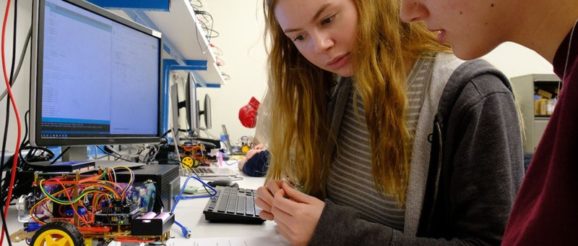Miami University’s new programs encourage exploration and innovation

Algebra, history, language, science. Many high school students wonder what it all means for their future careers. At Miami University, new future-inspired programs encourage students to explore many course subjects.
Students may want to write a novel or design an invention or even start a company. Why not do that while in college? Miami’s honors program will expand to a new Honors College in fall 2021.
“We want to produce thinkers, servants and leaders whose courageous inquiry and innovative spirit will transform their chosen fields,” said Zeb Baker, director of the honors program.
A field that is continuing to grow is the gaming industry. In fall 2020, Miami will accept its first full freshman cohort into a new bachelor of science in games + simulation.
While gaming is a growth industry, Glenn Platt, the C. Michael Armstrong Chair and Professor of Marketing, said potential applications go well beyond video games played by teenagers.
“We want to prepare students for a world where game mechanics are everywhere,” he said, listing supermarket affinity cards and frequent flyer programs as examples. “This is the language of commerce today.”
Language and science go hand-in-hand in game design
Understanding how computer science, history and language arts work together is critical for success. Just ask Bob De Schutter, the C. Michael Armstrong Associate Professor of Applied Game Design. His digital game, “Brukel”, won a gold medal at the International Serious Play Awards 2019 in Los Angeles.
“Brukel”, an interactive game that recreates the narrative of a reminiscing elderly female World War II survivor, is based on the experiences of his Belgian grandmother Bie Verlinden. It combines history, storytelling, game design and the creative work of Miami undergraduate students.
“Games like Bob’s demonstrate the best that games can be: They make you think, learn and engage in ways that other media cannot,” said Platt, who also is the director of the interactive media studies program.
Automated intelligence is the future
Robotics is another industry pushing boundaries. Miami is designing a new bachelor’s degree in robotics engineering with the goal for approval by the state this fall.
Eight new courses have been designed in the Department of Electrical And Computer Engineering for the robotics major, including computer vision, kinematics of robotics and sensors and data fusion.
“Robotics and automated intelligence are the future of the technology industry,” said Greg Pope, a senior computer engineering major who will become a software developer for a defense contractor in Dayton after he graduates in May.
A new work+ program opens doors for students
Some students may need to work while taking classes. At Miami Regionals, students get that opportunity in a new work+ program.
Students can pursue a degree and work 24 hours a week. Employers pay each student’s tuition in addition to a salary, allowing them the opportunity to graduate with no debt.
About two dozen students from the Hamilton and Middletown campuses participated in work+ during the first semester of the program, said Kelly Brown, interim director of work+. Current employers include the Butler County Regional Transit Authority, thyssenkrupp Bilstein and the Fischer Group. The program will expand this fall to include new employers.
Miami University approaches learning with a liberal arts philosophy. What does that mean? All academic subjects work together to complement a student’s career goals. Explore Miami University at www.MiamiOH.edu.
Thank you for reading the Dayton Daily News and for supporting local journalism. Subscribers: log in for access to your daily ePaper and premium newsletters.
Thank you for supporting in-depth local journalism with your subscription to the Dayton Daily News. Get more news when you want it with email newsletters just for subscribers. Sign up here.
